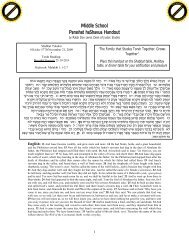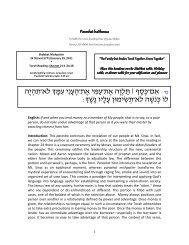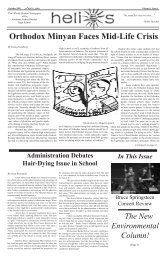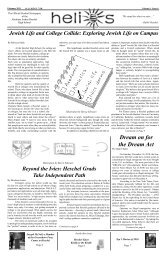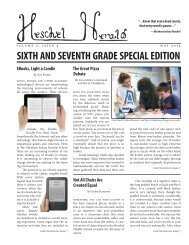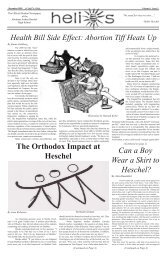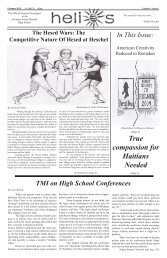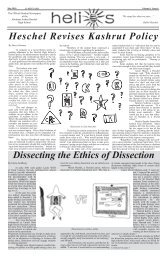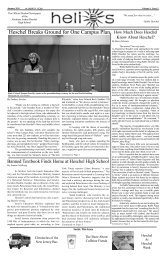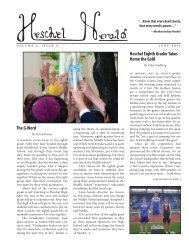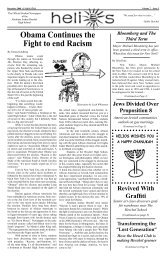Volume 9 Issue 1,October 2010 - The Heschel School
Volume 9 Issue 1,October 2010 - The Heschel School
Volume 9 Issue 1,October 2010 - The Heschel School
Create successful ePaper yourself
Turn your PDF publications into a flip-book with our unique Google optimized e-Paper software.
ְחשוןׁ ה“תשע‘ א<br />
<strong>October</strong> <strong>2010</strong> <strong>2010</strong><br />
Helios <strong>Volume</strong> 9 <strong>Issue</strong> 1 <strong>Volume</strong> 9 <strong>Issue</strong> Page 11<br />
<strong>The</strong> Official Student Newspaper<br />
of the<br />
Abraham Joshua <strong>Heschel</strong><br />
High <strong>School</strong><br />
“We stand for what we utter…”<br />
- Rabbi <strong>Heschel</strong><br />
By Anna Rothstein<br />
Seniors Install “Wall of Memories”<br />
By Gabriel Fisher<br />
Beneath a mural of memories, <strong>Heschel</strong> seniors enjoy a free period. Photographed by Cara Leiderman<br />
Students Ponder Time Management<br />
At any given moment, at least one student can usually<br />
be heard in the hallways complaining about the workload<br />
and the current stress level.<br />
Senior Mia Appelbaum said, “My workload this<br />
year is very rigorous and it’s stressful to have college applications<br />
on top [of everything else].”<br />
In order to combat stress and a heavy workload,<br />
<strong>Heschel</strong> students have developed study techniques that allow<br />
them to work efficiently. Most polled <strong>Heschel</strong> students<br />
seemed to agree that studying in a quiet, clean area, like the library,<br />
helps them learn the<br />
material best. Senior Nico<br />
Ravitch explained that he<br />
needs a “quiet, peaceful<br />
atmosphere” in order to<br />
study, and prefers to do his<br />
work at school. Others said<br />
they like to study in their<br />
room with the door closed.<br />
According to senior<br />
Ciara Sidell, studying<br />
on the subway is definitely<br />
the smartest way to go.<br />
Sidell commented, “My<br />
favorite place to study is<br />
on the train to school. Although<br />
I like studying in<br />
my room and on my couch,<br />
I tend to learn more if I am<br />
sitting on the subway with<br />
a study guide in hand. I<br />
won’t take my computer<br />
out on the subway, and that<br />
takes away a possible distraction.”<br />
While many students agreed with Sidell and find<br />
it distracting to study with an open computer, others find it<br />
more efficient to study on video chat with a friend.<br />
Though all students develop different work techniques,<br />
one of the key issues that most students struggle with<br />
is procrastination.<br />
Judith Tumin, ninth grade dean, commented on students’<br />
procrastination and the intense workload. She noted<br />
that there are a couple of different factors for why kids stay<br />
up so late doing work or studying. <strong>The</strong> first factor is that<br />
“there is something about the way a student focuses on homework<br />
that makes it take longer than it would ever need to.”<br />
Tumin believes that students would be able to do their work<br />
much faster if they did not procrastinate, spending time on<br />
their computers or watching T.V.<br />
Another factor that, according to Tumin, intensifies<br />
the <strong>Heschel</strong> workload is that “there is no such thing as 30<br />
minutes of homework for over 60 kids. You’re good at math,<br />
Illustration By Julie Maschler<br />
you’re not good at math. You write quickly, you write<br />
slowly.” Tumin explained that because all students<br />
work at different paces, it is difficult for teachers to create<br />
assignments that will only take roughly 30 minutes<br />
for all students to complete.<br />
Students are also, as Tumin pointed out, “legitimately<br />
tired” after a long day of school and that<br />
“slows them down.” <strong>The</strong>ir drowsiness makes them less<br />
efficient workers.<br />
Tumin made it clear that the objective of the<br />
30-minute homework rule is to help teachers be mindful<br />
that students are receiving assignments from many<br />
different classes, and<br />
cannot have too much<br />
work in one specific<br />
class.<br />
Twelfth grade<br />
dean Natan Kapustin<br />
agreed with Tumin<br />
on this point and in<br />
addition said, “Thirty<br />
minutes is a legitimate<br />
compromise between<br />
too much work<br />
per class on the one<br />
extreme, and too little<br />
time per class on the<br />
other, with the understanding<br />
that less<br />
time than that makes<br />
it difficult for teachers<br />
to assign substantive<br />
work.”<br />
Benedict Carey,<br />
a staff writer for <strong>The</strong><br />
New York Times, published an article on September 6<br />
discussing effective study techniques. He noted in particular<br />
that psychologists have discovered that it is better<br />
to move around to different rooms when studying.<br />
<strong>The</strong> reason for this, as a senior author of the experiment<br />
stated, is that “when the outside context is varied, the<br />
information is enriched, and this slows down forgetting.”<br />
This would mean that students should not study<br />
only on the subway or only in school. Carey suggested<br />
that students vary their work environments.<br />
Another effective technique, Carey noted, is<br />
to study various types of material within one sitting.<br />
He said, “Musicians have known this [method] for<br />
years, and their practice sessions often include a mix of<br />
scales, musical pieces and rhythmic work.”<br />
According to Tumin, study techniques are not<br />
only important for high school students. Tumin said,<br />
“Time management is a critical skill to live in the real<br />
world.”<br />
Pictures are slowly spreading across the walls<br />
of the second floor. <strong>The</strong> once bare walls are increasingly<br />
filled with an array of photographs of seniors at<br />
different moments in their lives. <strong>The</strong> eclectic assortment<br />
of pictures ranges from snapshots taken during<br />
video chats to 7th grade class photographs from <strong>Heschel</strong><br />
middle school.<br />
<strong>The</strong> wall of memories began by chance. One<br />
day senior Rachel Weisberg decided to hang a picture<br />
she thought was amusing on the wall by the senior<br />
nook, the official hangout spot for the 12th grade class.<br />
“I was with Jenny [Katz] and she was coloring<br />
and I thought it would be a funny idea to take a picture<br />
of her coloring and put it up in the nook,” Weisberg<br />
said. “And then the next day I came to school and other<br />
people had started putting up pictures.”<br />
What began as an isolated event slowly gained<br />
steam as the walls by the Beit Midrash began to be<br />
flooded with funny and embarrassing pictures of the<br />
class of 2011.<br />
<strong>The</strong> photos tell the story of a grade that has<br />
grown close over its four years together in high school.<br />
Some students feel that the pictures represent all that<br />
is great about their grade and about <strong>Heschel</strong>’s culture.<br />
David Zemmol, a junior, said that the pictures “show<br />
the friendship that exists within the school and it shows<br />
how close they [the seniors] are as a grade and how<br />
much fun they had in their time at <strong>Heschel</strong>.”<br />
Continued on Page 3<br />
Is the Ground Zero Mosque<br />
Really a Mosque?<br />
By Becca Schwarz<br />
Recent newspaper headlines have been filled<br />
with controversy over the plans to build an Islamic community<br />
center two blocks away from where the Twin<br />
Towers stood nine years ago. Since first presented on<br />
May 5, the proposal for the project that has variously<br />
been called variously “<strong>The</strong> Ground Zero Mosque,” “Cordoba<br />
House,” and “Park51” has sparked major conflict<br />
across the country. With the emergence of the proposed<br />
project, Americans, and New Yorkers in particular, have<br />
been forced to confront their attitudes regarding 9/11,<br />
Islam, and freedom of religion.<br />
A large part of this heated debate concerns the<br />
religious character of the center, but is the “Ground Zero<br />
Mosque” really a mosque?<br />
<strong>The</strong> project’s original name, Cordoba House,<br />
refers to the city of Córdoba, Spain, famous as a model<br />
of harmonious coexistence among Jews, Christians, and<br />
Muslims between the 8th and 11th centuries. Though the<br />
center’s name was changed to reflect the building’s location<br />
on Park Place, its stated mission remains consistent<br />
with the name’s initial iteration.<br />
According to the Park51 website, the center’s<br />
goals are “pluralism, service, arts and culture, health and<br />
healing” and to “encourage dialogue, harmony and respect<br />
amongst all people, regardless of race, faith, gender<br />
Continued on Page 6<br />
Do you think the mosque should be built at<br />
Ground Zero? (What You Voted)<br />
Yes- 54%<br />
Undecided- 12%<br />
No-12%<br />
Another Location-22%
Page 2 Helios <strong>Volume</strong> 9 <strong>Issue</strong> 1 <strong>October</strong> <strong>2010</strong><br />
<strong>Heschel</strong> Community Focuses on Respect<br />
A main goal of the <strong>Heschel</strong> community<br />
is to create a respectful and peaceful<br />
environment among faculty and students.<br />
We make it a point at <strong>Heschel</strong> High<br />
<strong>School</strong> to be open to the ideas, beliefs, and<br />
opinions of others. <strong>The</strong> story of Tyler Clementi,<br />
the Rutgers freshman who committed<br />
suicide after a video of him engaged in<br />
sexual acts was posted on the internet, and<br />
the controversy over the proposed Islamic<br />
community center near Ground Zero serve<br />
as examples of the types of incivility we<br />
should learn from and avoid in our community.<br />
Judaism teaches us to treat others<br />
as we would like to be treated. When<br />
we were little, our parents and our teachers<br />
looked to make sure we weren’t stealing<br />
anyone’s markers or pushing other children<br />
around. However, as we grow older, it is<br />
no longer their responsibility to enforce<br />
respectful behavior. In high school, the responsibility<br />
is passed into the hands of the<br />
students to regulate behavior among themselves.<br />
We are entrusted with the task of<br />
being respectful towards our friends and<br />
classmates as well as towards people whom<br />
we do not know.<br />
This means that we must be respectful<br />
towards all people regardless of<br />
their race, religion, gender, financial status,<br />
or sexual orientation.<br />
In the controversy over the proposed<br />
Islamic center near Ground Zero,<br />
many people have equated all Muslims<br />
with terrorists. People reason that it would<br />
be dishonorable to those who died in the<br />
terrorist attack on September 11, 2001<br />
to show respect to Muslims by permitting<br />
them to build an Islamic Center a few<br />
blocks away.<br />
Editorial<br />
As Jewish teenagers and as <strong>Heschel</strong><br />
students, we should know better. Just<br />
because it was a Muslim terrorist group<br />
that crashed into the twin towers does not<br />
mean that all Muslims are radical extremists.<br />
Anyone could be a terrorist. Even Jews<br />
have committed acts of terror, like Baruch<br />
Goldstein, who, in 1985, murdered 29<br />
Muslims as they were praying in Hevron.<br />
All Jews are not terrorists because of the<br />
horrible acts of Baruch Goldstein. So too, it<br />
is unjustified to accuse all Muslims of being<br />
terrorists because a small minority has<br />
committed reprehensible acts.<br />
However, respect extends beyond<br />
the labels we apply to others. We cannot<br />
just accept the differences of others—we<br />
must embrace them as well. <strong>The</strong> story of<br />
Tyler Clementi should stand as a warning<br />
to show us what happens when we are inconsiderate<br />
of the identities of others.<br />
Recently the Student Government<br />
ran a town meeting activity that paired advisory<br />
groups from different grades. <strong>The</strong><br />
activity was an effort to help students recognize<br />
how their actions affect the people<br />
around them. In all the advisories, we saw<br />
how easy it was to disregard others either<br />
intentionally or unintentionally. A text message<br />
simply ignored can induce more pain<br />
than we think. Gossip affects everyone.<br />
Simply thinking beforehand can easily prevent<br />
harmful actions.<br />
<strong>Heschel</strong> students should be expected<br />
to hold the utmost respect and understanding<br />
for those around them. Whether it<br />
be through the words we speak or the actions<br />
we commit, <strong>Heschel</strong> students should<br />
always make sure that we are not judging<br />
based on assumptions and prejudices.<br />
Helios Information and Policies<br />
Helios is a newspaper published<br />
approximately seven times a<br />
year by the student staff of the Abraham<br />
Joshua <strong>Heschel</strong> High <strong>School</strong>, 20<br />
West End Avenue, NY, NY 10023.<br />
Telephone: 212-246-7717. E-mail: helios@heschel.org.<br />
Helios is distributed free to all<br />
members of the student body. <strong>The</strong> publication<br />
is a member of the Columbia<br />
Scholastic Press Association.<br />
Commentaries and opinion<br />
columns are the expressed opinion of<br />
the author and not of Helios and its<br />
editorial board or its advisors. Furthermore,<br />
the opinions are not those of the<br />
Abraham Joshua <strong>Heschel</strong> <strong>School</strong> faculty<br />
or administration.<br />
Letters to the Editor must include<br />
the writer’s name and class. Helios<br />
will not print anything deemed<br />
libelous, obscene, or in poor taste, in<br />
accordance with the Supreme Court’s<br />
justified standards. Rights are reserved<br />
to postpone, edit, or withhold from<br />
publication anything submitted which<br />
does not meet the specifications. <strong>The</strong><br />
meaning of any submission will be not<br />
altered, but we reserve the right to correct<br />
spelling, grammar, and punctuation<br />
when necessary. Additionally, Helios<br />
refuses to print criticism that is not<br />
constructive and supported by facts.<br />
Helios will not intentionally<br />
invade the privacy of any person and<br />
will make every effort to correctly<br />
spell names and make accurate class<br />
and position identifications. Accurate<br />
reporting of fact is the goal of the staff.<br />
Opinions will be clearly<br />
marked and found on the editorial<br />
pages or as designated on other pages.<br />
Corrections will be printed when mistakes<br />
are found or brought to the attention<br />
of the staff. Original stories will<br />
carry bylines, although stories rewritten<br />
by someone other than the original<br />
author will not receive a byline.<br />
Each issue will contain a staff<br />
editorial; this editorial will represent<br />
the views of the editorial staff on a<br />
particular issue. <strong>The</strong> editorial does not<br />
represent the views of all staff writers<br />
and artists.<br />
Members of the staff are guided<br />
by the Code of Ethics of the Society<br />
of Professional Journalists, which outlines<br />
principles of responsibility, fairness,<br />
and accuracy.<br />
Wacky Weather Strikes and Strikes Again<br />
By Aaron Ladds<br />
When Ciara Sidell stepped<br />
off the subway on the evening of September<br />
17th, her street in Queens had<br />
become a disaster zone. <strong>The</strong> sidewalk<br />
had been partially uprooted, and debris<br />
littered the sidewalk.<br />
<strong>The</strong> reason for the destruction<br />
on Sidell’s street was an unexpected<br />
tornado that tore through New<br />
York that evening. <strong>The</strong> sky turned to<br />
an ash color before large raindrops began<br />
to pour down on the city. <strong>The</strong> wind<br />
reached speeds of 100 miles per hour,<br />
tearing down trees and even killing one<br />
Queens resident, who was crushed by a<br />
falling tree.<br />
Several <strong>Heschel</strong> students were<br />
severely affected by the tornado. Rebecca<br />
Cooper, a <strong>Heschel</strong> senior who<br />
lives on Queens Boulevard, said that<br />
“the ground was uprooted, and it made<br />
it difficult to walk around Forest Hills<br />
for a few days even after the storm.”<br />
Ciara said, “Queens Blvd was a disaster,<br />
part of a billboard had fallen<br />
on the street, garbage cans were everywhere…<br />
I also was forced to walk<br />
three miles home from the subway.”<br />
Many homes, including Sidell’s, lost<br />
Illustration by Rebecca Schwarz<br />
their power for several days.<br />
<strong>The</strong> September 17 tornado<br />
was not the only weather disaster to<br />
affect <strong>Heschel</strong> students. On <strong>October</strong><br />
12, an unexpected thunderstorm<br />
erupted during an otherwise warm<br />
evening. <strong>The</strong> storm began at approximately<br />
8:30 p.m., when thunder and<br />
lightning lit up the night sky. Hail the<br />
size of quarters fell in some parts of the<br />
city. <strong>The</strong> storm did not let up until two<br />
and a half hours later.<br />
Helios Staff<br />
<strong>2010</strong>-2011<br />
Editors-in-Chief:<br />
Gabriel Fisher<br />
Emma Goldberg<br />
Art and Layout Editors:<br />
Gabrielle Belok<br />
Talia Niederman<br />
Sports Editor:<br />
Gabriel Klausner<br />
Contributing Writers:<br />
Hana Joy Ain<br />
Elliot Allen<br />
Naomi Blech<br />
Adam Chanes<br />
Rebecca Cooper<br />
Zachary Gaylis<br />
Aaron Ladds<br />
Shoshana Lauter<br />
Esther Lenchner<br />
Elizabeth Rauner<br />
Anna Rothstein<br />
Rebecca Schwarz<br />
Gabrielle Sherman<br />
Zachary Stecker<br />
Contributing Artists:<br />
Sasha Gayle-Schneider<br />
Cara Leiderman<br />
Rebecca Leeman<br />
Julie Maschler<br />
Shipley Mason<br />
Elizabeth Rauner<br />
Anna Rothstein<br />
Rebecca Schwarz<br />
Faculty and Staff:<br />
Lisa Cohen<br />
Gabe Godin<br />
Audrey Sieger<br />
Dena Schutzer<br />
We would like to formally thank<br />
Samuel Freedman. His dedication<br />
has helped us move Helios to<br />
the next level.<br />
Printing courtesy of Tri-Star<br />
Offset & Barry Goodman<br />
20 West End Avenue<br />
New York, New York 10023<br />
Send your<br />
comments<br />
to<br />
HS Newspaper on<br />
First Class.
<strong>October</strong> <strong>2010</strong> Helios <strong>Volume</strong> 9 <strong>Issue</strong> 1 Page 3<br />
Seniors Install “Wall of Memories”<br />
Students make nook their own. Photograph by Cara Leiderman<br />
By Adam Chanes<br />
From Sunday, <strong>October</strong> 3,<br />
through Tuesday, <strong>October</strong> 5, ten students<br />
from the Abraham Joshua <strong>Heschel</strong><br />
High <strong>School</strong> met in Washington<br />
with a representative of the American<br />
Israel Public Affairs<br />
Committee (AIPAC)<br />
in order to learn lobbying<br />
techniques.<br />
<strong>The</strong> students<br />
subsequently met with<br />
an aide to Representative<br />
Jerrold Nadler, a<br />
Democrat from New<br />
York. <strong>The</strong> group lobbied<br />
Nadler’s staffer<br />
on Israel-related matters.<br />
A I P A C ,<br />
founded in 1963, is an<br />
organization that lobbies<br />
Congress to support<br />
Israel’s actions<br />
and to maintain a strong USA-Israel<br />
alliance. In recent years, AIPAC has<br />
enhanced its lobbying efforts with the<br />
president’s administration as well.<br />
During this convention for<br />
high school students, a representative<br />
from AIPAC spoke to the students,<br />
teaching them how to lobby and how<br />
to be politically active. A way of getting<br />
involved in political activism, said<br />
the AIPAC rep, is by creating a relationship<br />
with one’s congressman and<br />
his aides. Additionally, the AIPAC<br />
representative emphasized the need to<br />
identify issues that could garner bipartisan<br />
support in Congress, rather than<br />
picking polarizing issues.<br />
From First Page<br />
Weisberg also believes that the photos help<br />
underclassmen feel as though the seniors<br />
are accessible. Weisberg said, “It helps the<br />
seniors bond to the rest of the school<br />
since we’re making fun of ourselves.”<br />
<strong>The</strong> pictures have caught the eye<br />
of every passerby. Many students who<br />
walk by the hall on their way to class<br />
stop to admire the pictures and sometimes<br />
laugh. Some, however, are still confused<br />
by their presence. Freshman Ben Davis<br />
said, “I don’t understand why it’s there,<br />
but it makes the school look fun.”<br />
Rabbi Natan Kapustin, a Limudei<br />
Qodesh teacher and the 12th grade dean, is<br />
a big fan of the wall. “I personally love the<br />
pictures that the senior class has put up in<br />
the nook,” Rabbi Kapustin said. “<strong>The</strong> senior<br />
nook has long been known informally<br />
as the ‘senior nook’ but this year’s seniors<br />
actually made it theirs, and made it into a<br />
comfortable spot with character - it feels<br />
like a fun place. I think it is an expression<br />
of their fun-loving, expressive nature.”<br />
Junior Maya Miller agreed, saying,<br />
“I think it’s a fun and creative way<br />
that the seniors choose to represent themselves.<br />
I like it.”<br />
However, the pictures have<br />
caused a small controversy. On <strong>October</strong><br />
12, Assistant Direction of Admissions<br />
Judy Ney requested that the seniors take<br />
down the photos for the night so that the<br />
school would look presentable for that<br />
High <strong>School</strong> Students Attend AIPAC Lobbying Seminar<br />
“AIPAC tries hard to pick bipartisan<br />
issues that aren’t controversial, and I<br />
respect and support that,” said Ethan<br />
Finkelstein, a junior at <strong>Heschel</strong>.<br />
After learning lobbying skills,<br />
the students met with an aide to Representative<br />
Nadler and lobbied him as<br />
<strong>Heschel</strong>’s AIPAC team lobbies in Washington D.C. Photograph by Tamar Stein<br />
“agents” of AIPAC. Three essential<br />
issues were discussed with the aide.<br />
Students lobbied in support of the Israel<br />
foreign aid bill, which mandates<br />
that Congress give $3 billion a year to<br />
Israel. <strong>The</strong> students also lobbied for<br />
sanctions against Iran to protect Israel<br />
from Iran’s nuclear threat, and emphasized<br />
the importance of working<br />
with Israel (rather than on behalf of<br />
Israel) so that the Palestinian Authority<br />
and the Israelis negotiate directly<br />
with each other in order to continue<br />
the peace process.<br />
Frustrating for the students<br />
who attended AIPAC was the fact that<br />
the congressional aide with whom they<br />
met was not a foreign-policy staffer.<br />
Skyler Siegel, a senior at <strong>Heschel</strong>, characterized<br />
the meeting as “a bit pointless<br />
to lobby someone who is not involved.”<br />
Despite their frustrations, the<br />
students did find AIPAC to be a rewarding<br />
experience. At AIPAC, students<br />
were given the opportunity<br />
to think<br />
about the politics<br />
of Israel-related<br />
issues, rather than<br />
labeling themselves<br />
“pro-Israel”<br />
without thinking<br />
deeply about the<br />
issues.<br />
Members of<br />
<strong>Heschel</strong>’s Israel<br />
Affairs club said<br />
that they have<br />
heard it suggested<br />
that AIPAC refuses<br />
to criticize any of<br />
Israel’s actions.<br />
However, Siegel and other students<br />
who attended AIPAC said that AIPAC<br />
accepts criticism of Israel, but believes<br />
that direct criticism of Israel by America<br />
does not strengthen the America-<br />
Israel alliance.<br />
As to whether there should be<br />
school-wide AIPAC meetings, Siegel,<br />
the co-coordinator of the Israel Affairs<br />
club at <strong>Heschel</strong>, said, “I don’t think that<br />
it is appropriate to have AIPAC educating<br />
the entire school about Israel, …but<br />
I do think that it is important for <strong>Heschel</strong><br />
students to get more involved in<br />
the American political process and be<br />
more cognizant of what is currently going<br />
on in Israel.”<br />
night’s open house for parents. Ney explained<br />
her request, saying, that although<br />
she loves them, “<strong>The</strong> pictures are just<br />
messy. We just wanted them [the seniors]<br />
to take it down for the open house because<br />
it’s important to us that the school looks<br />
clean. We just don’t want the parents to<br />
get the wrong message or to take it the<br />
wrong way.”<br />
By the next morning, the photos<br />
were already back up on the wall.<br />
Zoe Grossman, a senior and a<br />
strong proponent of the senior picture<br />
wall, sympathized with Ney’s request. Zoe<br />
believed that without proper context, outsiders<br />
who are unfamiliar with the easygoing<br />
environment of <strong>Heschel</strong> could misinterpret<br />
the purpose of the photographs.<br />
“I think the pictures do say a lot<br />
about our school and how much of a warm<br />
environment there is,” Grossman said.<br />
“But with that said, prospective parents<br />
and students can take them the wrong way.<br />
Taken out of context, people could interpret<br />
the pictures to mean that <strong>Heschel</strong> is<br />
not a serious work environment.”<br />
For now, the senior wall of pictures<br />
is here to stay, and some are even optimistic<br />
that seniors in years to come will<br />
continue to mark their territory by putting<br />
up funny photographs.<br />
Asked what she thought of the<br />
pictures becoming a tradition, Weisberg<br />
said, “it would be nice if we could leave<br />
our mark on the school in a creative way.”<br />
Epitome<br />
Takes Home<br />
the Gold<br />
By Emma Goldberg<br />
<strong>Heschel</strong> stresses a non-competitive<br />
environment, but in pursuing<br />
the goal of “learning for learning’s<br />
sake,” literary journal staff-members<br />
have picked up a gold medal along<br />
the way. On <strong>October</strong> 14th, it was announced<br />
that Epitome, the <strong>Heschel</strong><br />
High <strong>School</strong> literary journal, has received<br />
a gold circle award from the<br />
Columbia Scholastic Press Association<br />
(CSPA).<br />
Eleventh grade dean Sandra<br />
Silverman is the faculty advisor<br />
for Epitome, and the staff consists<br />
of grade representatives who solicit<br />
peers to create poetry, fiction, photography,<br />
and art for the journal.<br />
Staff members are also encouraged<br />
to learn how to design and layout a<br />
literary journal.<br />
CSPA facilitates an annual<br />
contest that judges high school literary<br />
journals, newspapers, and yearbooks<br />
from across the country. Gold<br />
Circle Awards represent the highest<br />
level of achievement and, according<br />
to CSPA, “recognize superior work<br />
by student journalists…as an entire<br />
staff working with either print or online<br />
media.”<br />
Epitome was not only awarded<br />
gold circle accolades, but also<br />
received additional honors for organization.<br />
Junior Daelin Hillman<br />
received a gold circle award for his<br />
photograph featured in Epitome,<br />
“Manhattan Circle.”
Page 4 Helios <strong>Volume</strong> 9 <strong>Issue</strong> 1 <strong>October</strong> <strong>2010</strong><br />
<strong>Heschel</strong> Offers<br />
New Minyanim<br />
By Hana Joy Ain<br />
In the <strong>Heschel</strong> <strong>School</strong>, t’fillah<br />
is mandatory. <strong>The</strong> school has a variety<br />
of minyanim that any student or<br />
teacher can join. <strong>The</strong> two traditional<br />
services, the egalitarian minyan and<br />
the orthodox minyan, are led in Ashkenazic<br />
tradition.<br />
A group of students have taken<br />
it upon themselves to create a Sephardic<br />
minyan. Having a Sephardic<br />
minyan is important to many students<br />
who are part of the Sephardic community.<br />
Junior Louis Ades said, “I’m<br />
more accustomed to Sephardic prayers<br />
and it makes me feel more at home in<br />
the school.” Alex Hedaya, also a junior,<br />
said, “I’m a Syrian Jew and that’s<br />
where my dad wanted me.”<br />
Many people feel that it is<br />
an excellent idea for students to start<br />
new minyanim. Rabbi Dahlia Kronish,<br />
head of Jewish student life and t’fillah<br />
coordinator, said, “…it is wonderful<br />
when students think reflectively about<br />
their t’fillah experiences and come<br />
up with new possible minyanim that<br />
would hopefully meet their t’fillah<br />
goals in a different way.”<br />
She also stated that it isn’t<br />
easy to start a new minyan. “Aside<br />
from the logistics involved –finding a<br />
facilitator, space, ensuring that there is<br />
sufficient student interest – when we<br />
start a new minyan, we need to identify<br />
its purpose and vision. What goals<br />
will it accomplish that other minyanim<br />
do not?”<br />
“Opening different<br />
minyanim allows<br />
students to explore<br />
t’fillah from various<br />
perspectives.”<br />
-Rabbi Dahlia Kronish<br />
Having such a large range of minyanim<br />
with different goals allows students<br />
to meet and make new friends<br />
from different grades. “It increases the<br />
diversity of the school’s curriculum,<br />
and helps more people become acculturated<br />
to <strong>Heschel</strong>,” said Ades.<br />
It makes the school a more interesting<br />
place and allows students to<br />
follow their interests and their beliefs.<br />
“<strong>The</strong> school would be a much blander<br />
place without all the different kinds of<br />
people and their opinions and interests,<br />
and to keep this school a lively<br />
and engaging place, I think that students<br />
should really advocate for what<br />
they want and believe in, which includes<br />
starting minyans.” said Marx-<br />
Arpadi.<br />
As Rabbi Dahlia said, “Opening<br />
different minyanim allows students<br />
to explore t’fillah from various<br />
perspectives.”<br />
Student Profile: Gabriel Benedict<br />
By Gaby Sherman<br />
Every fall, the halls of the<br />
<strong>Heschel</strong> <strong>School</strong> are filled with new<br />
faces. Usually those new students are<br />
members of the freshman class, but this<br />
year along with the rosy-cheeked freshmen<br />
came Gabriel Benedict, a foreign<br />
exchange student in the eleventh grade.<br />
From the town of Lausanne,<br />
near Geneva, Switzerland, Gabe took<br />
part in an exchange program as an opportunity<br />
to better his English-speaking<br />
skills and to study abroad for a few<br />
months. After spending his summer<br />
vacationing around America, he settled<br />
with his host family on the Upper West<br />
Side to live like a New Yorker for two<br />
months.<br />
It didn’t take Gabe long to<br />
adjust to his new surroundings, even<br />
though there are vast differences<br />
between the <strong>Heschel</strong> <strong>School</strong> and the<br />
school that Gabe attends in Lausanne.<br />
Gabe said that the unique studentteacher<br />
relationship that exists at <strong>Heschel</strong><br />
is significantly different from the<br />
system at home. At <strong>Heschel</strong>, he said,<br />
there is less pressure on the student to<br />
participate for the full duration of the<br />
class; though <strong>Heschel</strong> students are encouraged<br />
to participate and speak their<br />
minds, students will receive attention<br />
from their teachers even if they choose<br />
not to speak up. In Swiss schools, the<br />
teachers will not approach students; it<br />
is up to the student to get the teacher’s<br />
attention by constantly participating.<br />
In addition to the academic differences,<br />
<strong>Heschel</strong>’s social life also initially<br />
perplexed the Swiss student, who<br />
Teacher Profile: Gabriel Rubinson<br />
By Lizzi Rauner<br />
Native to Buenos Aires,<br />
Argentina, Gabriel Rubinson has a<br />
lot of experience with the Spanish<br />
language. For years, Gabi, as he likes<br />
to be called, has been teaching across<br />
North America, South America and<br />
even in Israel. “It runs in my blood,”<br />
said Gabi as he explained his connection<br />
to teaching; not only does he come<br />
from five generations of teachers, but<br />
Gabi’s grandparents were among the<br />
first Hebrew teachers in Argentina and<br />
opened one of the first Jewish schools<br />
in Buenos Aires.<br />
Gabi has many varied hobbies.<br />
“<strong>The</strong> list could go on and on,” he said.<br />
He “loves Netflix” and watching Spanish<br />
and Middle Eastern foreign films in<br />
his spare time.<br />
Additionally, Gabi loves to<br />
swim, dance, and draw. “When you<br />
swim you feel like it’s magic, “ he<br />
Gabriel Benedict Finds <strong>Heschel</strong> vastly different from his Swiss school.<br />
Photograph By Elizabeth Rauner<br />
has gained a myriad of nicknames,<br />
ranging form “Swiss Miss” to<br />
“Swiss Cheese.” Gabe wondered<br />
about the purpose of <strong>Heschel</strong>’s<br />
weekly advisory periods, finds<br />
town meetings redundant, and is<br />
puzzled by the games of ninja in<br />
the hallways.<br />
But <strong>Heschel</strong>’s environment<br />
and the overall feeling of comfort<br />
in the student community stems<br />
from the open-mindedness of the<br />
school’s mission statement and its<br />
openness to Jews of all religious<br />
backgrounds.<br />
In Lausanne, there are<br />
roughly two thousand Jews and<br />
Gabi Rubinson is in his element teaching at <strong>Heschel</strong>. Photograph By Sasha Gayle Schneider<br />
said, “You’re totally relaxed.”<br />
Gabi feels a deep connection to<br />
dancing as well. When he was<br />
younger he participated in Israeli<br />
dance groups that went to festivals<br />
every year. <strong>The</strong> three-day Carmel<br />
Festival in which Gabi participated<br />
included representatives from different<br />
provinces in Latin America.<br />
One of Gabi’s greatest<br />
talents is his ability to draw and<br />
paint. Gabi won three drawing<br />
awards as he grew up. Additionally,<br />
Gabi participated in drama<br />
and theatre classes at Buenos Aires<br />
University where he studied Media<br />
Art. Although he never considered<br />
using these skills professionally,<br />
Gabi dreamt of becoming at actor<br />
as a child.<br />
Before becoming a teacher,<br />
Gabi held many different jobs.<br />
Using his expertise in media, Gabi<br />
worked in advertising and at the<br />
one orthodox synagogue. Reform<br />
Judaism is exceedingly rare, if it exists<br />
at all. Before Gabe came to New<br />
York, he did not realize how many<br />
different types of practices there are,<br />
and how many self-labeled categories<br />
of Jews exist. While, in America,<br />
religious distinctions have to do with<br />
how observant one is, the main distinction<br />
between Jews in Switzerland<br />
is Sephardic versus Ashkenazi Judaism.<br />
Regardless of the differences<br />
between New York City and Lausuanne,<br />
Gabe is greatly enjoying his<br />
experience and hopes to visit again<br />
soon.<br />
Israeli Embassy in Buenos Aires.<br />
He worked for Steven Spielberg<br />
as a Historical Content Analyst,<br />
translating and cataloging videos of<br />
Holocaust survivors from Hebrew<br />
into English.<br />
After working in different<br />
fields of media, Gabi turned to his<br />
natural profession: teaching. He first<br />
taught Hebrew language at Kehillat<br />
Israel in Pacific Palisades in Los<br />
Angeles, California and then moved<br />
to teaching Spanish at the Milken<br />
Community High <strong>School</strong> in Los<br />
Angeles. “<strong>Heschel</strong> is very similar to<br />
Milken as far as the atmosphere and<br />
the mission statement. <strong>The</strong> teaching<br />
system is very similar, as well as<br />
the warmth of my co-workers and<br />
the Kehillah.”<br />
Gabi moved to New York<br />
recently, after several years in Los<br />
Angeles. “New York has a environment<br />
and lifestyle more similar to<br />
Buenos Aires than LA does. Except<br />
that here it is colder and it snows.<br />
Other than that it is the same; the<br />
people on the streets, the subways,<br />
sophistication, [lots of] culture,<br />
everything open [until] late, people<br />
are straightforward, fast pace, energy.”<br />
Teaching Jewish teenagers<br />
satisfies Gabi’s love of teaching. “I<br />
want them to enrich themselves as<br />
human beings incorporating Spanish<br />
with Jewish values.”<br />
Gabi brings his fascination<br />
with the fast-paced New York<br />
lifestyle to his classroom. “I enjoy<br />
the interactions that teenagers have<br />
to offer, their enthusiasm and excitement<br />
- they are always here for<br />
more.”
<strong>October</strong> <strong>2010</strong> Helios <strong>Volume</strong> 9 <strong>Issue</strong> 1 Page 5<br />
By Shoshi Lauter<br />
By Naomi Blech<br />
Dubai Plans a New City and a New Way of Living<br />
In light of the recent spike in<br />
teen suicides across the country, bullying<br />
has surfaced as a hot topic, one<br />
that is being discussed and debated in<br />
schools and communities across the<br />
country.<br />
Eight teens committed suicide<br />
due to bullying just in the month of<br />
September.<br />
Bullying exists within <strong>Heschel</strong>’s walls,<br />
albeit in a very different form than the<br />
kind that sparked the recent suicides.<br />
Junior Jesse Tauber said<br />
that, “it’s silent bullying with a lot<br />
of gossip and rumor spreading.”<br />
Many students said that<br />
they do not see much bullying<br />
occurring at <strong>Heschel</strong>. <strong>Heschel</strong><br />
is fortunate enough to be free of<br />
violence between students. However,<br />
silent bullying can be just as<br />
harmful as physical harassment<br />
and have the same devastating effects.<br />
Based on his own experience, Jesse<br />
said that this type of bullying<br />
can make a teenager paranoid that<br />
everyone is talking about him. It<br />
made Jesse “feel like [he] wasn’t<br />
wanted, to the point where [he]<br />
was afraid to come to school.”<br />
For <strong>Heschel</strong> students and<br />
teenagers in general, cyberbullying<br />
has become increasingly<br />
easier due to applications such as<br />
“formspring” and “honesty box”<br />
that allow people to post offensive<br />
comments to their peers anonymously.<br />
Cyberbullying takes away yet another<br />
safe haven for the students –they cannot<br />
even escape their tormenters at the<br />
end of the school day.<br />
Senior Jacob Berger said, “I<br />
think that people only bully other people<br />
when they are insecure or maybe<br />
they have been bullied themselves.”<br />
Many students interviewed for this article<br />
referred to this same dangerous<br />
cycle.<br />
Nehama Kramer recalled the<br />
story of a girl who tortured her classmate<br />
in school and on Facebook because<br />
of her red hair. It was later discovered<br />
that the bully’s original hair<br />
color was also red, and she was teasing<br />
her schoolmate because she was<br />
insecure herself.<br />
Tauber expressed the belief<br />
Illustration By Gabrielle Belok<br />
entists from Abu Dhabi are refining<br />
plans to expand the city. Students<br />
from all over the world go to this institute<br />
to study eco-efficient, sustainable<br />
living.<br />
Aside from Masdar’s ecofriendly<br />
features, Foster & Partners<br />
plans to make Masdar visually stunning,<br />
aesthetically modeled on ancient<br />
Arab settlements. Despite the<br />
city’s planned visual appeal, the<br />
AFDEC has expressed concern that<br />
Masdar may not attract permanent<br />
that this cycle stems from schools,<br />
communities, and families that teach<br />
about right and wrong in definitive<br />
terms and do not accept teens for who<br />
they are. “Teens are being killed and<br />
killing themselves,” Tauber said, because<br />
they do not fit into the norms<br />
that are taught to them from a young<br />
age. Jesse himself talked about two<br />
kids he knew personally, one who<br />
committed suicide at the age of eleven<br />
because he was bullied severely about<br />
his race and sexuality, and one who<br />
had to switch schools because of a<br />
death threat.<br />
If teens are told to believe that<br />
only one value or lifestyle is correct, it<br />
Picture a desert city perched<br />
on a pedestal. This city has pedestrian-only<br />
streets, and driverless cars<br />
transports citizens through underground<br />
tunnels.<br />
In fact, this city will<br />
soon exist. It will be called<br />
Masdar, and the foundation<br />
for its construction lies in the<br />
middle of the Arabian Desert.<br />
Construction of Masdar<br />
will be completed by 2013,<br />
and by 2020 the city will have<br />
thousands of inhabitants.<br />
Headed by the Abu Dhabi Future<br />
Energy Company, the AD-<br />
FEC, this new metropolis is to<br />
be the first carbon-free, zerowaste,<br />
solar-dependent city to<br />
date. Masdar is to be an energy-efficient<br />
utopia, setting an<br />
example for a more environmentally<br />
friendly world.<br />
Foster & Partners, experts<br />
in new-age technological<br />
architecture, are designing<br />
Masdar with many unique features.<br />
Firstly , Masdar will be built<br />
as a carless city, with streets only for<br />
pedestrians. Driverless cars, running<br />
on electricity, will move through tunnels<br />
underground. <strong>The</strong>y will transport<br />
people throughout the city and<br />
will navigate based on passenger instructions.<br />
Masdar will also be lifted<br />
off the ground and placed on a very<br />
large pedestal, in order to take advantage<br />
of the winds and solar heat<br />
that surround the city. Winds will<br />
cool down the temperatures in Masdar<br />
by almost 70 degrees daily. 90%<br />
of the city’s energy will come from<br />
solar paneling, and the other 10%<br />
will come from waste recycling.<br />
Masdar currently consists of<br />
a small science institute, where top<br />
architects and environmental sciresidents.<br />
It may be difficult for residents<br />
to alter their lifestyles, adjusting<br />
to a carless, elevated desert city.<br />
Ideally, the AFDEC hopes to<br />
attract residents of all ages-- not only<br />
young students, but businesspeople,<br />
families, and the elderly as<br />
well.<br />
Masdar is not the only city<br />
“going green.” Manhattan<br />
has also recently adopted a<br />
sustainable initiative. In June<br />
of 2009, construction was<br />
completed for Mayor Michael<br />
Bloomberg’s proposed<br />
pedestrian walkway in Times<br />
Square. This walkway reduces<br />
traffic congestion in the<br />
region, and encourages locals<br />
to walk or take public transportation<br />
in the area, rather<br />
than driving.<br />
<strong>The</strong> AFDEC hopes that Masdar<br />
will stand as an example<br />
to cities across the globe that<br />
hope to tackle initiatives similar<br />
to Mayor Bloomberg’s<br />
pedestrian walkway. In the<br />
mission statement for Masdar,<br />
the AFDEC states, “Masdar City<br />
will set a benchmark that will ultimately…provide<br />
a functioning blueprint<br />
for sustainable living around<br />
the world.”<br />
In Light of Recent Suicides Across the Country, <strong>Heschel</strong> Students Reflect on Bullying at Home<br />
Illustration by Talia Niederman<br />
can create a dangerous world for people<br />
who do not live their lives in that<br />
fashion.<br />
<strong>The</strong> issue that <strong>Heschel</strong> faces<br />
is how to prevent bullying when it is<br />
silent, making it hard to detect.<br />
<strong>The</strong> large number of students who responded<br />
that bullying does not exist at<br />
<strong>Heschel</strong> reflects the fact that not everyone<br />
is affected by or cognizant of<br />
its presence in the school. However,<br />
the fact that even a few people claim<br />
to be victims of such bullying proves<br />
that it is an issue that should be addressed.<br />
Many students stressed that<br />
more of an adult presence could<br />
help address the issue on some<br />
occasions. Students expressed a<br />
wish for a counselor who is more<br />
present in their every day lives. It<br />
is important to students to have a<br />
person and a place that they can<br />
go to for safety besides their advisory.<br />
Ninth grader Elan Goldberg<br />
said “Verbal bullying is something<br />
that happens all the time through<br />
gossip as well as just telling people<br />
off. People need to learn how<br />
to look at things from different<br />
perspectives and think about how<br />
they would feel if that happened to<br />
you. It is definitely a serious problem<br />
and undoubtedly something<br />
worth addressing.”<br />
If anything should help the<br />
community be more conscientious<br />
of its words, it is the memory of the<br />
recent teen suicides. “What starts as<br />
something funny,” said senior Hannah<br />
Laytner, “more often than not, turns<br />
into something hurtful.”
Page 6 Helios <strong>Volume</strong> 9 <strong>Issue</strong> 1 <strong>October</strong> <strong>2010</strong><br />
Is the Ground Zero Mosque Really a Mosque?<br />
From Page One<br />
or cultural background.” <strong>The</strong>y strive to<br />
“revive the historic Muslim tradition of<br />
education, engagement and service” and<br />
offer social services to women, families,<br />
children, seniors, and small business owners.<br />
<strong>The</strong> building would be open to all<br />
New Yorkers, no matter their religion.<br />
<strong>The</strong> building plan calls for many<br />
facilities, including a pool, basketball<br />
court, gym, culinary school and restaurant,<br />
library, art studios, exhibition space, childcare<br />
services, and a September 11 memorial.<br />
It would also have a prayer space,<br />
which would occupy two of the building’s<br />
thirteen stories and could accommodate<br />
between 1,000 to 2,000 people. According<br />
to the Cordoba Initiative Blog, the official<br />
blog of the project, the prayer space<br />
would, by definition, not be a mosque.<br />
<strong>The</strong>y argue that “certain aspects of Cordoba<br />
House disqualifies [sic] it as a mosque,<br />
including space for musical performance<br />
or a restaurant, which are not allowed to<br />
be in a mosque.”<br />
So what is all the controversy<br />
about? Based on Park51’s own website<br />
and the building plans, the project and<br />
amenities make it sound similar to the Upper<br />
West Side’s JCC of Manhattan.<br />
Those opposed to the center<br />
claim that the construction of an Islamic<br />
religious site, despite its many cultural<br />
facilities, would be disrespectful to the<br />
memory of those who died on 9/11. For<br />
By Emma Goldberg<br />
them, Ground Zero encompasses the surrounding<br />
areas, not only the actual space<br />
where the Twin Towers once stood. <strong>The</strong>re<br />
are two long-established mosques not far<br />
from the proposed location—one twelve<br />
blocks away from the site, and another just<br />
four blocks away—but for some objectors,<br />
particularly those who lost family or<br />
friends in the attacks, no location can be<br />
far enough.<br />
Like their fellow New Yorkers,<br />
<strong>Heschel</strong> students’ opinions range from<br />
<strong>Heschel</strong> High <strong>School</strong> Dodges America’s AP-ization<br />
Half a dozen students graduated<br />
last year with highly-coveted college credit<br />
on their resumes. <strong>The</strong> reason: Advanced<br />
Placement. But it wasn’t easy.<br />
Most schools, public and private,<br />
offer AP courses that allow students<br />
to place out of college courses, ranging<br />
from world history, to biology, to calculus.<br />
<strong>Heschel</strong>, however, has chosen not to offer<br />
courses preparing students for the AP test.<br />
<strong>The</strong> <strong>Heschel</strong> students who took the calculus<br />
AP exam in May of <strong>2010</strong> did not study<br />
the curriculum offered by College Board.<br />
Rather, the students studied independently<br />
for the test, participating in weekly study<br />
sessions with <strong>Heschel</strong> calculus teachers<br />
Edy Lucas and Bosi Kinar.<br />
Said <strong>Heschel</strong> alum Aaron Freedman,<br />
currently a freshman at Swarthmore<br />
University, “¬It really was a difficult test.<br />
I’d be lying if I said that we weren’t intimidated<br />
walking into that testing room. I<br />
don’t think that anyone found it easy, even<br />
though we were given a lot of studying<br />
support from Edy and Bosi.”<br />
<strong>The</strong> AP program, launched by the<br />
Ford Foundation in 1952, has stirred controversy<br />
in high schools across the country.<br />
Though the college credit offered is seen<br />
as a boost in the college admissions process,<br />
the exam is also known to be very<br />
difficult. Many cite the test as a source of<br />
competition and stress in United States<br />
high schools.<br />
<strong>Heschel</strong> history teacher Shmuel<br />
Afek has previously taught in several<br />
schools that do offer Advanced Placement<br />
courses. Afek is “not a very big fan of AP<br />
courses.”<br />
According to High <strong>School</strong> Head<br />
Ahuva Halberstam, “AP courses are a mile<br />
wide, but only an inch deep. <strong>The</strong>y cover a<br />
great breadth of material, but they do not<br />
explore the material deeply. At <strong>Heschel</strong>, we<br />
pride ourselves on offering courses that are<br />
interesting, deep, challenging, and suit the<br />
culture of our school.” Halberstam also offered<br />
several perks to attending a non-AP<br />
school. “By not offering AP’s, we help to<br />
promote a non-competitive school environment.<br />
From the very beginning, <strong>Heschel</strong><br />
has always been against the idea of pitting<br />
students against one another on exams<br />
such as the AP. When you do that, you lose<br />
the joy of learning.”<br />
Junior Adiel Schmidt is also not<br />
a fan of the AP. “We already have enough<br />
stress with our dual curriculum,” Schmidt<br />
said. “We don’t need the added stress and<br />
competition of an AP course.”<br />
For many students, the stress factor<br />
appears not to be a deterrent. According<br />
to the College Board, which has administered<br />
the program since 1955, over<br />
one million students across the United<br />
States were in enrolled in AP courses in<br />
2006 alone. By <strong>2010</strong>, a record high 2.9<br />
million students took the AP exam.<br />
In an article dated June 13, <strong>2010</strong>,<br />
Newsweek journalist Jay Matthews referred<br />
to the trend as the “AP-ization of<br />
America.” Though Matthews warned that<br />
Advanced Placement tests may be “taking<br />
over our high schools,” many New York<br />
schools—including Ramaz, Dalton, and<br />
Fieldston-- have chosen a course similar<br />
to <strong>Heschel</strong>’s, deciding to drop Advanced<br />
Placement courses.<br />
Judy Ney, Assistant Director of<br />
Illustration by Shipley Mason<br />
Illustration by Anna Rothstein<br />
adamant support for the construction of<br />
Park51 to the assertion that the mosque<br />
should not be built. Students in support<br />
of the center claim that while its presence<br />
might offend the families of those who<br />
died in the 9/11 attacks, the center must be<br />
built to maintain America’s image as a free<br />
country. Ilan Goldberg, a <strong>Heschel</strong> freshman,<br />
said that “although it might be inappropriate<br />
to build the mosque, it would<br />
be against the Constitution not to allow it.<br />
Senior Tzvi Pollock agreed, “Those who<br />
High <strong>School</strong> Admissions, said that parents<br />
often question her about <strong>Heschel</strong>’s decision<br />
not to offer Advanced Placement courses.<br />
“People definitely ask me about it,” Ney<br />
said. She added that parents are often curious<br />
as to whether this decision affects<br />
college admissions. “It usually does not<br />
end up as a problem though,” Ney added.<br />
“I explain that <strong>Heschel</strong> does not believe in<br />
teaching to the test. Our teachers like to expand<br />
their curriculums, offering interesting<br />
content that is not necessarily required by<br />
College Board.” Ney said that this response<br />
usually satisfies parents, and the AP is rarely<br />
a negative factor when students deliberate<br />
whether to come to the high school.<br />
However, not all are as happy<br />
about <strong>Heschel</strong>’s choice to dodge the AP<br />
test, preferring a more noncompetitive atmosphere.<br />
Some <strong>Heschel</strong> students and parents<br />
have voiced the concern that lack of<br />
Advanced Placement courses serves as a<br />
drawback in college admissions.<br />
According to junior Michael Cooperstein,<br />
“I think <strong>Heschel</strong> should definitely<br />
offer AP courses. It is a boost in the college<br />
admissions process if students took an AP<br />
course. Honors classes are challenging, but<br />
they are not as prestigious as AP courses.<br />
protest the Islamic center are undermining<br />
everything our country stands for.”<br />
However, some students feel that<br />
the feelings of the families and friends of<br />
the victims of the attacks must be taken into<br />
account. Talia Niederman, a senior, said<br />
that “the founders of the mosque should be<br />
taking these people’s opinions into serious<br />
account,” and proposed that “the project<br />
should only move forward with approval<br />
from the families of those who died on<br />
9/11.”<br />
Likewise, Sigal Palley, a sophomore,<br />
said, “Why should families of the<br />
9/11 victims have to go through the pain<br />
of having a mosque by the place where<br />
their loved ones died because of an Islamic<br />
terrorist group?” She continued, “<strong>The</strong>y<br />
should build it at least a mile away.”<br />
Of the thirty-nine <strong>Heschel</strong> students<br />
surveyed about the project, only one<br />
was firmly against it. Nehama Kramer, a<br />
freshman, declared, “I absolutely hate the<br />
idea of a mosque being at a place that was<br />
destroyed partly because of a Muslim influence.”<br />
Some students feel that not building<br />
the center signifies giving in to religious<br />
stereotyping. Asher Elbaz, a sophomore,<br />
said that “many terrorists are Muslim, but<br />
few Muslims are terrorists.”<br />
Kathryne Prince, another sophomore,<br />
supported the Park51 project, asserting<br />
that “people need to realize that just<br />
because certain people do horrible things,<br />
the entire culture should not be blamed.”<br />
<strong>The</strong>y just don’t count for as much.”<br />
Freedman, who took the AP in<br />
May of last year, had an overall positive<br />
experience with the test. “<strong>The</strong> truth is, the<br />
people who worked hard and studied a lot<br />
were satisfied and found it to be a really<br />
good experience. If you feel confident in a<br />
certain subject, taking the AP really can’t<br />
hurt, and it is very beneficial in terms of<br />
placing out of courses in college.”<br />
Matthews of Newsweek corroborates<br />
Freedman’s view, and adds that the<br />
Advanced Placement exam is, “virtually<br />
required for any student who wants to get<br />
into a selective college.” <strong>The</strong> Advanced<br />
Placement exams are seen as a boost for<br />
college admissions, setting apart students<br />
who are able to tackle the difficult coursework<br />
of an AP class.<br />
<strong>Heschel</strong> college advisor Micki<br />
Talmadge does not see AP exams as a college<br />
prerogative. “Colleges evaluate students<br />
based on the courses offered by their<br />
schools. If a school offers AP’s and a student<br />
decides to take an AP course, that’s<br />
great. But colleges can’t evaluate students<br />
based on courses they are not offered.”<br />
Halberstam added that, “colleges<br />
are not permitted to discriminate against<br />
schools that do not offer the AP in the admissions<br />
process.” Halberstam also said<br />
that because every university has its own<br />
varying advanced placement policy, taking<br />
an AP course in high school does not guarantee<br />
college credit.<br />
According to Talmadge, <strong>Heschel</strong><br />
has its own assets to boost students in the<br />
college admissions process. “<strong>Heschel</strong> is<br />
seen as a school that offers rigorous academics,<br />
even without offering AP courses.”<br />
Afek voiced support for Talmadge’s<br />
view that AP courses are not<br />
necessary in <strong>Heschel</strong>’s serious learning<br />
environment. “In the schools that I have<br />
formerly taught in, the main reason that<br />
they offered AP courses was to demonstrate<br />
to parents that they had rigorous academics,”<br />
Afek said. “<strong>Heschel</strong> doesn’t need<br />
to prove anything to parents. We demonstrate<br />
our serious academics every day in<br />
all of our classrooms.”
<strong>October</strong> <strong>2010</strong> Helios <strong>Volume</strong> 9 <strong>Issue</strong> 1 Page 7<br />
Fun in <strong>The</strong> Sun: <strong>Heschel</strong> Students’ Summer Adventures<br />
By Zachary Stecker<br />
With the final bell<br />
on the eighteenth of June,<br />
<strong>2010</strong>, summer vacation officially<br />
began. Excitement and<br />
enthusiasm raced through<br />
<strong>Heschel</strong>’s halls as students<br />
eagerly discussed their plans<br />
for the next two and a half<br />
months. Some would spend<br />
their break from school in<br />
summer camp, others would<br />
simply cherish it as a little<br />
bit of quiet time at home.<br />
A number of <strong>Heschel</strong><br />
students, however,<br />
went on to spend the summer<br />
months working on<br />
various internships.<br />
Notably, senior<br />
Tobias Citron worked as<br />
an intern for Jared Pollis,<br />
a Colorado congressman.<br />
Representative Pollis,<br />
a 35-year-old Jewish<br />
congressman, is the only<br />
person ever to be elected<br />
to congress as an openly gay man. As an<br />
intern, Citron “answered calls, responded<br />
to constituent mail,” and had the privilege<br />
of attending “some briefings and hearings<br />
about different issues hosted by different<br />
congresspersons and organizations.”<br />
“<strong>The</strong> coolest part,” recalled Citron,<br />
“was being able to go basically anywhere<br />
in the capitol, or on Capitol Hill,<br />
including the underground tunnels that<br />
run through the whole complex.”<br />
Working for a politician included<br />
some moments Tobias found particularly<br />
amusing. “I was repeatedly cursed<br />
at on the phone,” he said, “and I was told<br />
that [the idea of] Iran’s nuclear capabilities<br />
was a conspiracy concocted by the<br />
American Israel Public Affairs Committee.”<br />
While Citron spent his time<br />
working on Capitol Hill for his country,<br />
other students chose to devote their sum-<br />
Heliostyle: Silly Bandz Have<br />
Lots of Fanz!<br />
By Gabi Ben-Yaish<br />
Silly Bandz have become a viral<br />
obsession among America’s youth. <strong>The</strong>se<br />
silicone animal-shaped bracelets are now<br />
a nation-wide trend. Although Silly Bandz<br />
became a fashion statement over a year<br />
ago, the fad has continued to grow.<br />
Silly Bandz are now estimated to<br />
be a $200 million industry, and could grow<br />
to become a billion dollar industry. Even<br />
celebrities like Sarah Jessica Parker, Mary-<br />
Kate Olsen, and Justin Bieber have been<br />
spotted sporting the bracelets. Silly Bandz,<br />
formerly sold only in clothing stores, are<br />
now being sold at local drugstores, toy<br />
stores, and delicatessens.<br />
<strong>The</strong> trend has hit <strong>Heschel</strong> High<br />
<strong>School</strong> as well. According to junior Leeza<br />
Gavronsky, “people used to think that Silly<br />
Adam Cole poses with friends in Ecuador. Photograph by Adam Cole<br />
<strong>Heschel</strong> students are Silly Bandz fanz! Photograph By Rebecca Leeman<br />
Bandz were kind of lame, but I’ve definitely<br />
seen a big increase in the number of<br />
Silly Bandz around the <strong>Heschel</strong> hallway.<br />
<strong>The</strong>y’ve become so popular.”<br />
Heliostyle TREND REPORT:<br />
One of my personal favorite trends this<br />
season fits perfectly with the <strong>Heschel</strong><br />
dress code. Maxi skirts are coming back!<br />
Maxi skirts—which are much longer than<br />
the average skirt-- are a fashionable way<br />
to stay covered up, while still looking<br />
cute. My suggestion is to pair them with<br />
a crop top, or any basic tee to maintain<br />
the casual look. As for footwear, I would<br />
suggest wearing a combat boot, oxford or<br />
flat. <strong>The</strong> beauty of the Maxi is that you<br />
can wear anything with it because of its<br />
versatility, making it an easy, yet stylish,<br />
wear.<br />
mers to traveling abroad, with a focus<br />
on donating time and resources to another<br />
community.<br />
Junior Adam Cole, journeyed to Ecuador<br />
with fourteen strangers – twelve<br />
teenagers and two adults – for three<br />
weeks, the first of which was set aside<br />
for community service. Based in the nation’s<br />
Capital, Quito, Cole and his peers<br />
worked with orphans known as niños de<br />
Movie Review: Never Let Me Go<br />
By Esther Lenchner<br />
Never Let Me Go is a movie<br />
adaption of a dystopian novel written<br />
by the Japanese-English author Kazuo<br />
Ishiguro. <strong>The</strong> movie was directed by<br />
Mark Romaneck (One Hour Photo), and<br />
stars Carrey Mulligan (An Education),<br />
Andrew Garfield (<strong>The</strong> Social Network,<br />
star of the upcoming Spiderman), and<br />
Keira Knightley (Pirates of the Caribbean).<br />
<strong>The</strong> characters<br />
of Mulligan,<br />
Garfield,<br />
and Knightly<br />
meet as children<br />
in Hailsham, a<br />
boarding school<br />
with an ominous,<br />
eerie atmosphere.<br />
All of the students<br />
at the school<br />
wear electronic<br />
bracelets that they<br />
swipe whenever<br />
they enter or leave<br />
a building. <strong>The</strong><br />
school administration<br />
claims to take<br />
all measures to<br />
care for the health<br />
of the students.<br />
However,<br />
as the plot thickens,<br />
the audience learns that the children<br />
are being raised in order to be harvested<br />
for their organs, and will eventually be<br />
killed when they have no more organs<br />
left to donate. <strong>The</strong> children are blissfully<br />
unaware of this until a teacher, frustrated<br />
la calle – literally “children<br />
of the street” – who are taken<br />
off of the street and given<br />
jobs to help get them back on<br />
their paths.<br />
“We hung out with<br />
them, played soccer with<br />
them, we taught them some<br />
English,” said Cole. Overall,<br />
he said, “It was pretty awesome.”<br />
Cole spent his second<br />
week working on an organic<br />
farm, where he learned about<br />
the advantages of permiculture,<br />
the philosophy by<br />
which the farm’s inhabitants<br />
live, which prohibits them<br />
from wasting anything.<br />
On a typical farm day,<br />
Cole would “wake up at<br />
5:30 AM, feed the chickens,<br />
harvest food for dinner, and<br />
eat breakfast.” He said that<br />
“everything [on the farm] is<br />
covered in manure.” After a<br />
while though, “you get used<br />
to it.”<br />
Cole spent his third and final<br />
week on the Galapagos Islands, doing<br />
what he describes as “standard Galapagos<br />
activities,” including mountain biking<br />
and swimming with baby sharks.<br />
As people often say about experiences<br />
such as these, “the best part was<br />
the people I was with,” said Cole. “That’s<br />
really what I think about when I look<br />
back on those fond memories.”<br />
with the ignorance of the children, informs<br />
them of their fates.<br />
Andrew Garfield stars in a lead<br />
male role. His character is innocent and<br />
lovable, but his innocence is painful<br />
to watch, as he tries to postpone his organ<br />
donations and ultimately his time<br />
of death. At one point, Garfield gives a<br />
heart-wrenching scream that expresses all<br />
of his pent-up frustration over the life he<br />
must lead, which is designed to optimize<br />
his organ donation potential.<br />
Though Garfield’s<br />
story is one<br />
of heart-wrenching<br />
tragedy, Mulligan’s<br />
story centers<br />
on her childhood<br />
crush. Throughout<br />
her boarding<br />
school years, Mulligan<br />
expresses a<br />
deep love for Garfield.<br />
However,<br />
this affection is<br />
disrupted by the relationship<br />
between<br />
Knightly and Garfield<br />
that develops<br />
throughout their<br />
years at boarding<br />
school. Mulligan’s<br />
frustration over her<br />
unrequited love,<br />
intertwined with<br />
her pain and repressed emotions, heightens<br />
the emotional content of the film.<br />
Mulligan, Garfield, and Knightley<br />
all give touching performances and<br />
leave the audience moved, in an emotional<br />
state that cannot be shaken off.
Page 8 Helios <strong>Volume</strong> 9 <strong>Issue</strong> 1 <strong>October</strong> <strong>2010</strong><br />
SPORTS<br />
Fantasy Sports Take Over<br />
<strong>Heschel</strong> High <strong>School</strong><br />
Hidden Gems<br />
<strong>The</strong><br />
Inglorious Bastards<br />
(1978)<br />
By Gabriel Klausner<br />
Year after year, the girls<br />
Varsity Volleyball team is a top contender.<br />
With a fresh roster, including<br />
three starting juniors, this year’s<br />
team is full of talent. For these girls,<br />
the season started early, with preseason<br />
workouts beginning in mid-<br />
August.<br />
<strong>The</strong> squad has won six of its<br />
first eight games, and with one more<br />
remaining, looks to close out the<br />
regular season on a high note. Team<br />
captains Jenny Katz, Hannah Laytner,<br />
and Charlotte Marx-Arpadi all<br />
expressed great optimism and high<br />
expectations, saying that the team’s<br />
hard work since day one has paid<br />
off. This group is more than capable<br />
It has infested the world,<br />
this generation, and this school with<br />
its drafts, free agents, and trade proposals,<br />
taking over life in the classroom<br />
and at home. <strong>The</strong> pandemic<br />
is fantasy sports, and it isn’t going<br />
away anytime soon.<br />
Small colonies of students<br />
gather at the beginning of every<br />
professional sports season, drafting<br />
players to be on their fantasy teams.<br />
Each player’s statistics are tallied<br />
up as part of those of the fantasy<br />
team’s, as teams go head to head<br />
in a race for the league championship.<br />
Now, the majority of students,<br />
mostly female, are crying out: “Do<br />
these guys not have a life? I mean, a<br />
fake league with fake teams, this is<br />
an embarrassment to humankind!”<br />
However, according to <strong>Heschel</strong><br />
seniors Daniel Kressel and Jacob<br />
Feld, this phenomenon is more<br />
than a little fantasy world. Kressel<br />
said, “Fantasy sports is a large piece<br />
of our social activity both in school<br />
and at home. <strong>The</strong>re is a lot on the<br />
line, this is high stakes gaming, and<br />
those who are involved take it quite<br />
seriously.” <strong>The</strong> “stakes” that Kressel<br />
refers to is a winner-take-all pot<br />
of upwards of $300 or $400. Feld<br />
said the money aspect is “extra incentive<br />
and brings the level of interest<br />
and dedication one step higher.”<br />
When pressed about the gambling<br />
piece of the equation, they both<br />
were quick to point out that a Ramaz<br />
<strong>School</strong> fantasy basketball league recently<br />
started with a $300 buy-in per<br />
team, leading to a $3,600 pot. With<br />
big bucks on the line, a fantasy team<br />
general manager understandably approaches<br />
running his squad with the<br />
utmost attention and discipline.<br />
<strong>The</strong> question, though, is<br />
how the obsession came about? For<br />
fantasy general manager and <strong>Heschel</strong><br />
senior Alec Rudin it was quite<br />
simple. “Fantasy sports are perfect<br />
for me because I don’t have the athleticism<br />
to compete in real life, nor<br />
can I run a professional sports team<br />
– this is the closest I can get to the<br />
real competition.”<br />
For fantasy sports devotees,<br />
managing a team in cyberspace is<br />
the first step towards the dream of<br />
real-life managing prowess.<br />
<strong>Heschel</strong> Heat Volleyball Once<br />
Again A Top Contender<br />
By Zachary Gayliss<br />
of winning the championship.<br />
Despite the squad’s overall<br />
success, they feel somewhat neglected<br />
by the school. <strong>The</strong> crowd<br />
was nearly non-existent at the team’s<br />
home opener, something that would<br />
never happen at a Varsity Boys basketball<br />
game. <strong>The</strong> team deserves<br />
more attention considering the talent<br />
on its roster.<br />
<strong>The</strong> captains made it known<br />
that with more support from the fans,<br />
they will feed off the increased energy<br />
and continue to thrive.<br />
By Elliot Allen<br />
Hello, readers. <strong>The</strong> first film<br />
I would like to discuss is <strong>The</strong> Inglorious<br />
Bastards, known in Italian as<br />
Quel maledetto treno blindato, directed<br />
by Enzo G. Castellari, should<br />
not to be confused with the 2009<br />
film Inglourious Basterds, directed<br />
by one of the most influential directors<br />
of the modern, cinematic age,<br />
Quentin Tarantino.<br />
Most of you probably have<br />
not heard of this little Italian war<br />
movie, which is understandable, but<br />
it is a shame because the film is really<br />
quite good. <strong>The</strong> Inglorious Bastards<br />
was part of a minor subgenre<br />
known as “Macaroni Combat”.<br />
<strong>The</strong>se films were Italian-made war<br />
movies inspired by such American<br />
classics as <strong>The</strong> Dirty Dozen and Kelly’s<br />
Heroes. <strong>The</strong>se films were characterized<br />
by minimal budgets and<br />
greater violence than their American<br />
counterparts.<br />
<strong>The</strong> plot of <strong>The</strong> Inglorious<br />
Bastards concerns four military convicts<br />
during World War II who escape<br />
custody and team up to escape<br />
to the neutral territory of Switzerland<br />
where they will be free. Along<br />
the way they are pursued by Axis<br />
and Allied forces alike. Many exciting<br />
firefights and explosions occur<br />
along the way, satisfying everybody’s<br />
need for the cathartic joys of<br />
Nazi death. Eventually, the Bastards<br />
get a chance to redeem themselves<br />
through a secret military operation,<br />
and the action increases exponentially.<br />
I loved this movie for one<br />
main reason: its protagonists. <strong>The</strong><br />
Bastards are just so loveable and full<br />
of distinct character. All the ingredients<br />
for the perfect band of soldiers<br />
are present in this film. <strong>The</strong>re is the<br />
brave leader, played by veteran actor<br />
Bo Svenson, the unscrupulous,<br />
party-loving thief, the rookie, and<br />
the two who I personally believe exhibit<br />
the greatest screen chemistry,<br />
the tough Samuel L. Jackson-esque<br />
black guy, and in a matching set, the<br />
insane racist.<br />
<strong>The</strong> interplay between <strong>The</strong><br />
Bastards is a joy to see, and not a<br />
second of screen time will go by<br />
without either a cheer for <strong>The</strong> Bastard’s<br />
triumphs or a laugh for <strong>The</strong><br />
Bastard’s stupidity. This movie really<br />
makes you root for <strong>The</strong> Bastards;<br />
even though they are criminals, they<br />
have honorable characteristics, and<br />
all they really want is to be left in<br />
peace.<br />
This movie is just plain<br />
fun. If you enjoyed the Nazi-killing<br />
romp that was Quentin Tarantino’s<br />
Inglourious Basterds, then you will<br />
most certainly love the original film<br />
that inspired Mr. Tarantino’s opus.<br />
I wholeheartedly recommend this<br />
movie. Until next time, enjoy.<br />
In Elliot Allen’s new column,<br />
he will highlight films underappreciated<br />
even in their own times. Allen<br />
said, “I hope that once recommended,<br />
these films will be watched, and<br />
the joy that I felt while viewing these<br />
movies can be passed on to others<br />
for them to laugh, cry, and just simply<br />
be entertained.”



